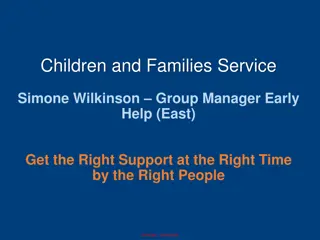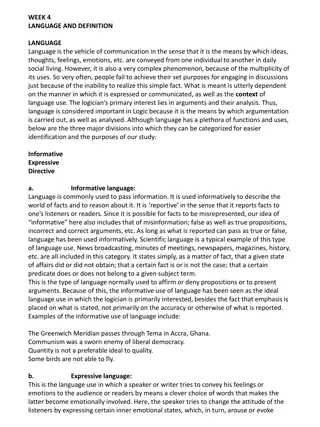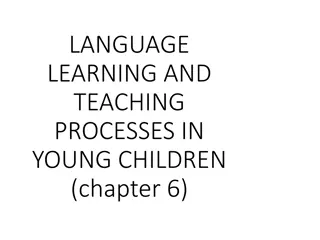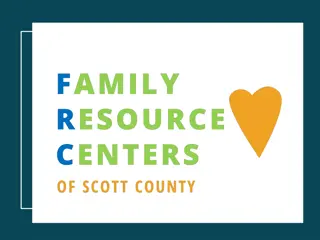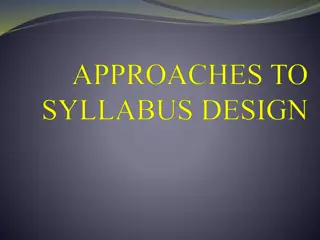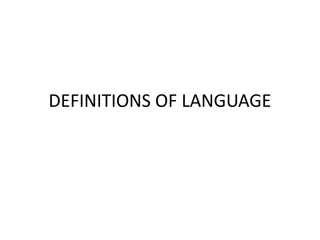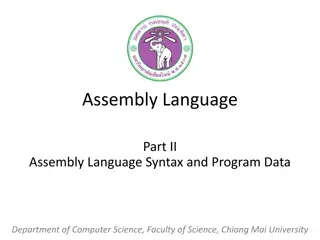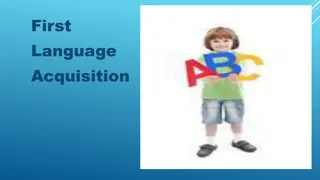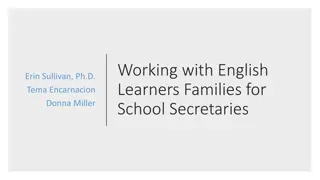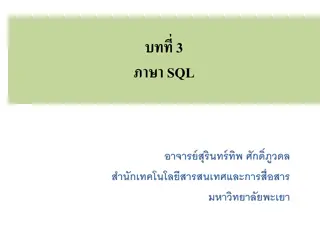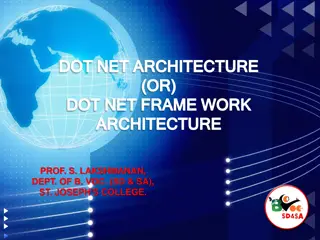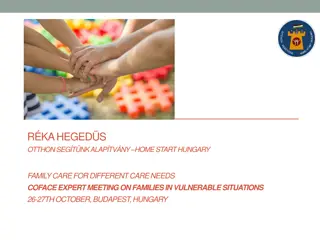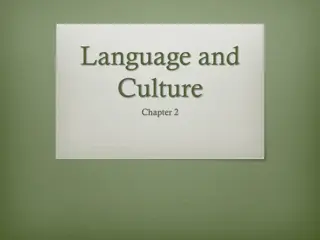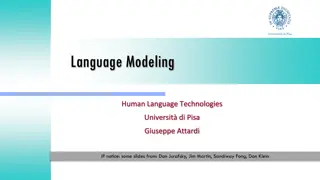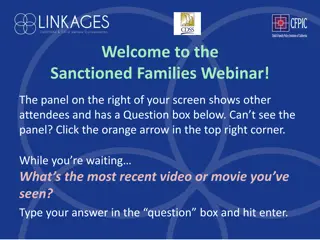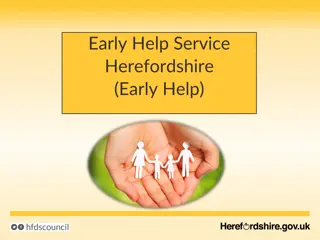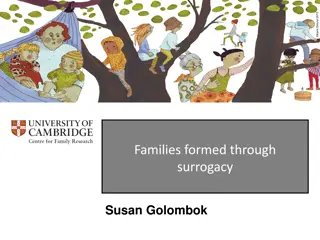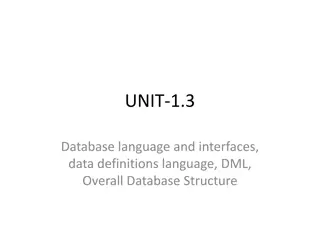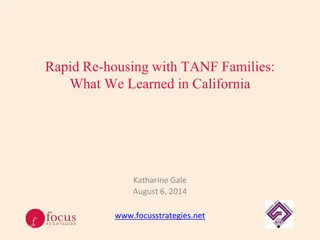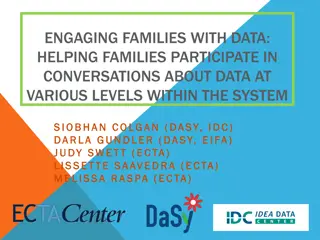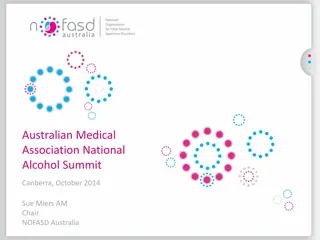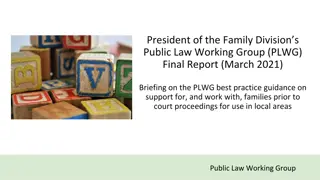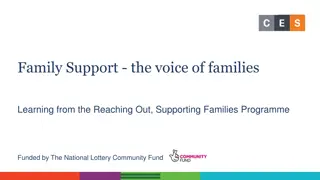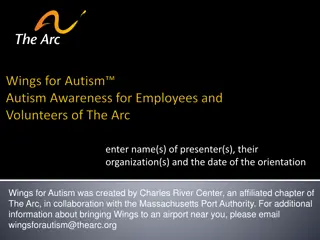Career Opportunities and Challenges in Translation & Interpreting Pedagogy Post-Pandemic
The APTIS 2022 conference explores new avenues in Translation and Interpreting (T&I) pedagogy amidst a changing landscape. Dr. Bego A. Rodriguez highlights emerging roles for T&I graduates. The context reveals a decline in language learning in the UK, impacting the Language Service Industry. The UK'
0 views • 13 slides
Language Study Community – Enhance Your Language Skills
Joining a Language Study Group is a fantastic way to take your language learning to the next level. By leveraging the power of Group Study, you can immerse yourself in the language, enhance your understanding, and build confidence in your speaking abilities. Read full article \/\/explainlearning.com
1 views • 3 slides
Academic Language Demands and Supports in Instructional Planning
Academic Language Demands and Supports are crucial in educational settings to ensure comprehension and usage of language by students. This content discusses embedding language demands in lesson plans, providing language supports, and peer review activities to enhance academic language skills. The fo
6 views • 10 slides
The Significance of Media in Language Learning
Media plays a crucial role in language learning by raising awareness of the ideology behind linguistic structures and providing valuable information on society and culture. Linguists are drawn to media language for research purposes and to understand its impact on language use and attitudes. Media s
11 views • 5 slides
Understanding Translation: Key Concepts and Definitions
Translation involves transferring written text from one language to another, while interpreting deals with oral communication. Etymologically, the term "translation" comes from Latin meaning "to carry over." It is a process of replacing an original text with another in a different language. Translat
11 views • 76 slides
Language and Communication in Society: Understanding Interactions
Explore the intricate relationship between language and society through lectures focusing on language in interaction, power dynamics, language contact and change, public space discourse, linguistic landscaping, and more. Delve into the shift from structural linguistics to societal communication, red
6 views • 28 slides
Comprehensive Overview of Children and Families Service Support System
This comprehensive overview delves into the structure and operations of the Children and Families Service, including details about the Early Help team, Youth Justice Service, Children and Families Practice Model, and Multi-Agency Screening Team. The provided information highlights the collaborative
4 views • 17 slides
Understanding Language: Informative, Expressive, and Directive Uses
Language serves as a vital medium for communication, allowing the conveyance of ideas, thoughts, and emotions. It is a complex phenomenon with diverse uses. This text delves into the three major divisions of language use - informative, expressive, and directive. Informative language conveys facts, w
3 views • 6 slides
Language Learning and Teaching Processes in Young Children
Development of language in young children is influenced by various factors such as their cultural and linguistic environment, unique characteristics, and interactions with adults. Optimal language development requires language stimulation from the environment. Varied cultural practices impact langua
1 views • 51 slides
Understanding Language in Stoicism: Significance and Corporeality
Language in Stoicism plays a crucial role in the process of assenting to impressions by focusing on corporeality, reason, and truth. It distinguishes between the mundane vocal sounds, articulated speech, and significant language to convey meanings effectively. The significance of language lies not i
0 views • 13 slides
Family Resource Centers (FRCs): Strengthening Families and Communities
Family Resource Centers (FRCs) provide safe, accessible spaces for families to access coordinated services and support tailored to their needs. By promoting community engagement and utilizing a whole-family approach, FRCs aim to reduce child abuse, strengthen families, and support positive outcomes
0 views • 14 slides
Understanding Language Teaching Syllabus: Integration, Theory, and Approaches
Language Teaching Syllabus involves the integration of subject matter and linguistic elements, guided by theories of language and learning. Various approaches like Grammatical, Situational, Communicative, and Analytic are used to structure syllabi. Breaking language into parts aids in sequential lea
1 views • 28 slides
Exploring Language and Communication Through a Short Film
In this lesson, students will watch a 10-minute short film titled "The Most Beautiful Thing" by Cameron Covell. They will reflect on the value of learning another language, analyze how facial expressions and body language convey emotions, and develop empathy towards those facing language barriers or
0 views • 29 slides
Various Definitions of Language Throughout Linguistic History
Different linguists and scholars have offered various definitions of language over time. Sapir (1921) emphasized language as a method of communicating ideas, emotions, and desires through voluntary symbols. Bloch and Trager (1942) focused on the social aspect of language as a system of vocal symbols
1 views • 12 slides
Introduction to Assembly Language Syntax and Program Data
Learn about the syntax of assembly language and how data, variables, and constants are used in programming. Explore the basic instructions and the translation of high-level language into assembly language. Discover the role of an assembler in translating assembly language programs into machine langu
3 views • 36 slides
Enhancing Language Learning Across the Curriculum in B.Ed. 1st Year Course
Language Across the Curriculum (LAC) emphasizes that language learning should occur across all subjects, not just in language classrooms. It highlights the importance of incorporating language development into every learning activity, fostering multilingualism in schools. Language plays a crucial ro
2 views • 34 slides
Understanding First Language Acquisition Process
First language acquisition is the process through which humans develop the capacity to perceive, comprehend, and effectively use language to communicate. It primarily focuses on infants acquiring their native language. Basic requirements, caregiver speech features, and the acquisition schedule play
0 views • 19 slides
Working with English Learners Families in Schools
This resource discusses important aspects of working with English learner families in schools. It covers topics such as reasons for immigration, the Home Language Survey, Welcome Center referrals, and guidelines for assisting students with English language support needs. The content provides guidanc
0 views • 24 slides
Comprehensive Overview of SQL Commands and Language Categories
In this detailed guide, you will learn about Structured Query Language (SQL) including its various commands such as Data Definition Language (DDL), Data Manipulation Language (DML), Data Control Language (DCL), and Transaction Control Language (TCL). Explore how SQL is used in Database Management Sy
0 views • 15 slides
Speech and Language Developmental Milestones: A Bilingual/Multilingual Perspective
Speech and language developmental milestones are crucial for children, regardless of their home language. These milestones encompass receptive language, expressive language, pragmatics, and articulation and phonology. Understanding how a child hears and talks from birth to one year is essential, as
1 views • 23 slides
Understanding .NET Framework Architecture and Common Language Runtime
This content delves into the intricacies of .NET architecture, highlighting its structure, common language runtime, and key components such as Common Type System (CTS) and Common Language System (CLS). It explains how .NET supports multiple languages, facilitates cross-language interoperability, and
0 views • 13 slides
Analyzing Writer's Language Use in English Language GCSE Component 2
In English Language GCSE Component 2, students learn to analyze how writers use language. The learning objective focuses on commenting, explaining, and analyzing language use with relevant subject terminology. The exam assesses students on their ability to interpret and explain a writer's thoughts,
0 views • 12 slides
Supporting Families in Need: Home-Start Hungary and COFACE Expert Meeting
Home-Start Hungary offers support to families with young children facing challenges through a network of trained volunteers. The COFACE Expert Meeting in Budapest focuses on families in vulnerable situations, providing mental health-based support and positive parenting strategies. They recruit coord
0 views • 10 slides
Language and Culture Reflections: Diversity in Linguistic Emphasis
Exploring the correlation between language and culture, this content delves into how various languages reflect cultural values and priorities. Through examples like the Inuit language with rich vocabulary for snow and seals, the Shinzwani culture's unique word for mother and aunt, and the evolving l
0 views • 50 slides
Understanding Language Modeling in Human Language Technologies
Exploring the concepts of language modeling in human language technologies, this presentation delves into N-grams, the chain rule of probability, evaluation metrics like perplexity, smoothing techniques such as Laplace, and the goal of assigning probabilities to sentences. It covers applications lik
1 views • 81 slides
Linkages Shared Learning Webinar: Supporting Sanctioned Families
Explore best practices and insights from the field in helping sanctioned families succeed through Linkages Shared Learning Webinar. Understand sanctions basics, examples from Imperial and Tehama counties, coordination between CWS social workers and CalWORKs employment specialists, and collaboration
0 views • 23 slides
Introduction to Language Technologies at Jožef Stefan International Postgraduate School
This module on Knowledge Technologies at Jožef Stefan International Postgraduate School explores various aspects of Language Technologies, including Computational Linguistics, Natural Language Processing, and Human Language Technologies. The course covers computer processing of natural language, ap
0 views • 27 slides
Comprehensive Community Support Services for Empowering Families
This program offers a range of essential services like community garden, wifi hotspots, computer center, and social gathering areas for families to achieve self-sufficiency. It focuses on engaging families, identifying strengths, setting goals, and providing support in various life domains such as e
0 views • 20 slides
Exploring Sociolinguistics: Language Variation and Social Factors
Sociolinguistics delves into the study of language variation influenced by social factors, examining the relationship between language and its social context. It explores various aspects like standard pronunciation, language choice, speech acts, language components, language variety, and factors suc
0 views • 73 slides
Early Help Service in Herefordshire: Supporting Families at the Right Time
Early Help Service in Herefordshire aims to support families proactively to prevent the need for more specialized services or social care interventions. Local authority teams like CHAT and Early Help Coordinator provide assistance, advice, and guidance to families. Completing Early Help Assessments
0 views • 21 slides
Understanding Assembly Language Programming for Computing Layers
Assembly language is a low-level programming language that enables direct interaction with a computer's hardware components. This content explores the fundamentals of assembly language, the relationship between human-readable machine language and binary code, an assembly language program for multipl
0 views • 31 slides
The Impact of Surrogacy on Family Dynamics and Child Development
Research conducted by Susan Golombok examines surrogacy families, highlighting concerns, comparisons with natural conception families, and the emotional dynamics within such families. The study explores parent-child relationships, psychological effects on children, and the evolving relationships wit
0 views • 38 slides
Database Language and Interfaces Overview
A database management system (DBMS) requires appropriate languages and interfaces to handle queries and updates for data manipulation and control. This includes Data Definition Language (DDL), Data Manipulation Language (DML), Data Control Language (DCL), and Transaction Control Language (TCL). Each
0 views • 12 slides
Insights on Rapid Re-housing with TANF Families in California
Communities in California implemented Rapid Re-housing Programs combined with TANF support between 2009 and 2012. The program design, data management, and coordination were crucial elements that influenced the success of re-housing efforts. Despite challenges in rehousing large families and those wi
0 views • 7 slides
Understanding Language Anxiety in Foreign Language Learning and Teaching
Explore the impact of language anxiety on students and teachers in foreign language learning and teaching contexts through insights from Dr. Christina Gkonou's research. Delve into the theoretical background, implications for language education, and real-life experiences shared at the Essex Language
0 views • 25 slides
Engaging Families in Data Conversations: Strategies for Effective Participation
Highlighting the importance of involving families in discussions about data at all system levels, this session aims to inform and engage families in conversations regarding local and state-level data. Strategies for sharing data with families will be shared and brainstormed, emphasizing the principl
0 views • 18 slides
Understanding Fetal Alcohol Spectrum Disorder (FASD) and Supporting Families
Fetal Alcohol Spectrum Disorder (FASD) poses significant challenges for individuals and families, requiring unique parenting approaches and lifelong support. The National Organisation for Fetal Alcohol Spectrum Disorders (NOFASD) in Australia provides crucial information, support services, and advoc
0 views • 18 slides
Best Practice Guidance for Working with Families in Public Law
The President of the Family Divisions Public Law Working Group (PLWG) released a final report in March 2021, focusing on support for families prior to court proceedings. The report emphasizes the importance of collaborating with families, prioritizing the welfare of the child, and making timely and
0 views • 11 slides
Family Support: Reaching Out and Supporting Families Programme
The Reaching Out, Supporting Families Programme, funded by The National Lottery Community Fund, aims to empower children and families to overcome adversity, learn together, and be active members of their communities. Through partnerships with voluntary and statutory agencies, the program has reporte
0 views • 13 slides
Understanding Wings for Autism Program and Family Travel Challenges
The Wings for Autism program, created by Charles River Center in collaboration with the Massachusetts Port Authority, aims to provide a supportive travel experience for families including individuals with autism and developmental disabilities. The event, catering to 33 families, addresses challenges
0 views • 8 slides






